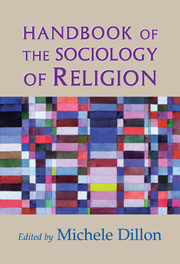Book contents
- Frontmatter
- Contents
- List of Contributors
- Acknowledgment
- Part One Religion as a Field of Sociological Knowledge
- Part Two Religion and Social Change
- Part Three Religion and the Life Course
- 12 Religious Socialization
- 13 In Rhetoric and Practice
- 14 Religiousness and Spirituality
- 15 Religion and Health
- Part Four Religion and Social Identity
- Part Five Religion, Political Behavior, and Public Culture
- Part Six Religion and Socioeconomic Inequality
- References
- Index
15 - Religion and Health
Depressive Symptoms and Mortality as Case Studies
Published online by Cambridge University Press: 05 June 2012
- Frontmatter
- Contents
- List of Contributors
- Acknowledgment
- Part One Religion as a Field of Sociological Knowledge
- Part Two Religion and Social Change
- Part Three Religion and the Life Course
- 12 Religious Socialization
- 13 In Rhetoric and Practice
- 14 Religiousness and Spirituality
- 15 Religion and Health
- Part Four Religion and Social Identity
- Part Five Religion, Political Behavior, and Public Culture
- Part Six Religion and Socioeconomic Inequality
- References
- Index
Summary
Most scholars who study the links between religion and health – whether they specialize in sociology, psychology, gerontology, epidemiology, or some other field – rely heavily on sociological foundations. As Idler and Kasl (1997) succinctly explained, Durkheim's (1897/1951) sociological study of suicide and Weber's (1922/1993) sociology of religion have described three pathways by which religion might affect human health and well-being. First, Durkheim noted that religion tends to provide, in Idler and Kasl's (1997) words, a “regulative function” (p. S294). Many religions provide rules that are considered by adherents to be binding not only in religious, spiritual, and ethical matters, but in the most basic human concerns, including eating, drinking, and sexual intimacy. Indeed, it seems uncanny how discoveries in biomedical science concerning the major vectors for the greatest health problems of the modern world (e.g., cardiovascular disease, cancer, diabetes, obesity, HIV/AIDS) have shown the great practicality of the prescriptions and proscriptions of many religions regarding alcohol, tobacco, food, and sex.
Idler and Kasl (1997) additionally pointed out that Durkheim supposed that religion also can have an “integrative function” (p. S294), providing people with meaningful and tangible connections to other people, fostering the transfer of social capital.
- Type
- Chapter
- Information
- Handbook of the Sociology of Religion , pp. 190 - 204Publisher: Cambridge University PressPrint publication year: 2003
- 9
- Cited by

